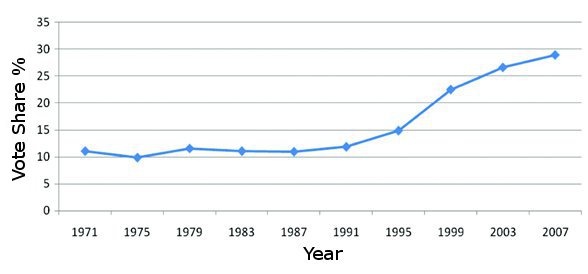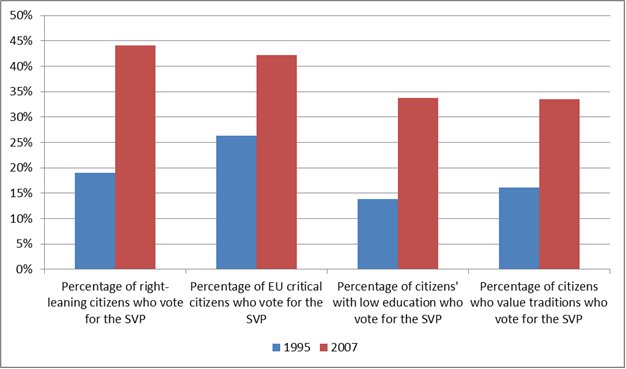 In the past two decades the Swiss People’s Party (SVP) has established itself as the most powerful radical right-wing party in Western Europe. Daniel Stockemer assesses the factors behind the SVP’s success, concluding that the party has not significantly expanded its appeal beyond traditional support bases, but has instead become more effective at attracting existing right-wing voters. The SVP have also benefited from greatly increasing their organisational capacity, with their success at least partly explained by the fact that they are the only party with a permanent presence in all of the Swiss cantons.
In the past two decades the Swiss People’s Party (SVP) has established itself as the most powerful radical right-wing party in Western Europe. Daniel Stockemer assesses the factors behind the SVP’s success, concluding that the party has not significantly expanded its appeal beyond traditional support bases, but has instead become more effective at attracting existing right-wing voters. The SVP have also benefited from greatly increasing their organisational capacity, with their success at least partly explained by the fact that they are the only party with a permanent presence in all of the Swiss cantons.
Over the last 20 years, the Swiss People’s Party (SVP) has successfully transformed itself from a conservative party into a radical right-wing party. Coinciding with the rise of the party`s charismatic leader Christoph Blocher in the 1990s, the SVP began to embrace initiatives to halt immigration, engaged in historical revisionism and spread anxiety about globalization and Switzerland`s possible entry into the European Union. By adopting this set of internally consistent propositions based on Swiss identity and the idealization of the Swiss nation – a right-wing Weltanschauung – which make both proscriptive and prescriptive demands on human behaviour (i.e. the promotion of domestic culture or the abolition of immigration), the SVP has experienced an outpouring of popular support over the past two decades.
The party has established sections in each of Switzerland’s 26 cantons and attracted upwards of 60,000 dues paying members by the early 2000s, and upwards of 90,000 by 2010. Even more importantly, the party’s electoral support doubled over the past fifteen years from 15 per cent in 1995 to 29 per cent in 2007, as shown in Figure 1, below. While the party lost 2 per cent of its vote share and `merely` gained 27 per cent of the popular vote in the 2011 general elections, the SVP continues to be the strongest party in the Swiss national assembly and the most powerful radical right-wing party in Western Europe.
Figure 1: SVP vote development 1971 – 2007

Despite the party`s unprecedented success, there is little information about its electoral support base and especially the party`s new voters, who have started to support the party over the past 15 years. Did the SVP open up new voting constituencies over the past two decades? Is the Swiss electorate moving more toward the right? Has the SVP had more success in mobilizing its core base? To answer these questions, I used individual voting data from the Swiss Electoral Study for the years 1995 and 2007. Analysing the impact of several independent variables (i.e. age, education, political socialisation, the respondents` political ideology as well as the importance of traditions and costumes) on individuals` self reported vote choice in favour of the SVP, I find that the characteristics of SVP voters have hardly changed between the two elections.
With the exception that men were more likely to vote SVP in 2007 as compared to 1995, the typical SVP supporter had the same characteristics: he or she is an individual with conservative traditional views, low education, who has been socialized into a right-wing milieu. However, while the types of SVP voters have not changed, what has changed is that the SVP has been more successful in mobilizing its base. For example, as shown in Figure 2 below, in 1995, the party only gained 20 per cent of the vote of those individuals who self-identified as conservative and right-wing, whereas it received more than 44 per cent of the vote of the same constituency 12 years later. The same trend applies for individuals with low education. Among citizens who left school before obtaining a high-school diploma, the SVP was able to increase its vote share by more than 150 per cent from 14 per cent in 1995 to 34 per cent in 2007.
Figure 2: The SVP’s mobilisation of its base – change in percentage support by citizen group, 1995-2007

Rather than attracting new voters from a different ideological spectrum, the SVP managed to double its electoral support by tapping more strongly into its traditional base (i.e. by attracting traditional right leaning voters with low education and some right-wing socialization). Two scenarios explain this increase in the party`s vote. First, the party’s push to the right and its focus on identity politics differentiates the SVP from the other three mainstream parties (the Social Democratic Party, the Free Democratic Party and the Christian Democratic Peoples’ Party), who are generally pro-European and lean to the center-left of the ideological spectrum. This clear demarcation makes the SVP stand out among conservative citizens and allows the party to tap into the rather large base of conservative voters; an electorate that shows stronger presence in Switzerland than in other European countries.
Second the party’s success likely stems, to some degree, from its strong organizational capacity. As of 2011, the SVP is the only party that is present in every canton and permanently visible in Swiss society thanks to its permanent campaign activities. This also implies that the SVP’s future vote prospects are rather positive; it is likely that the Swiss radical-right will consolidate its vote base in the short and medium term. To a large degree, citizens vote SVP because they concur ideologically with some or all of the party’s positions (in particular, some citizens’ appreciation of their traditional Swiss culture is entrenched and unlikely to wane in the future). Lacking political alternatives, traditional citizens will most likely continue to see the SVP as a protector of their interests. This should apply, even more so, if we consider that the internal and external pressures that push Switzerland to open itself to the European Union will continue to increase rather than decrease.
This is a summary of the article: Stockemer, Daniel 2012. “The Swiss Radical Right: Who are the New Voters of the Swiss Peoples` Party?” Representation 48(2): 197-208.
Please read our comments policy before commenting.
Note: This article gives the views of the author, and not the position of EUROPP – European Politics and Policy, nor of the London School of Economics.
Shortened URL for this post: http://bit.ly/QXZYqs
_______________________________
 Daniel Stockemer – University of Ottawa
Daniel Stockemer – University of Ottawa
Daniel Stockemer is an Assistant Professor at the School of Political Studies at the University of Ottawa. His research interests include political participation, political representation, social movements and right-wing extremism.


